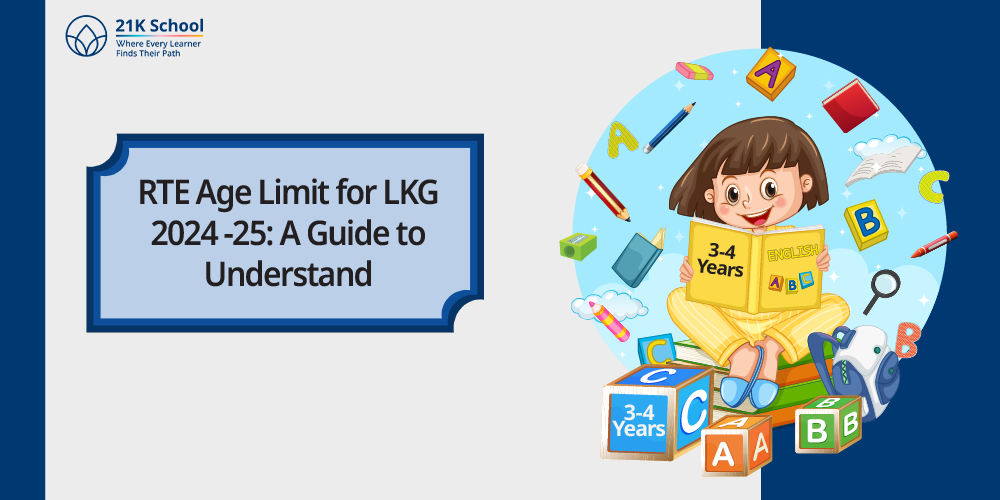
Do you know what is the ideal age limit for LKG 2026-27?
The Right to Education Act offers dedicated guidelines for education. However, the age limit for LKG varies from state to state, which typically starts from 3 years.
The Right to Education Act was introduced as a modalities in August 2009 with a main focus on providing free and compulsory education to students between the age group of 6 to 14 years.
The ideal age which most of the schools follow for Lower Kindergarten is between 3 to 4 years and after that children proceed for UKG. However, the age limit for LKG varies for every state and as per the schools policies as well as children’s needs.
According to the RTE Act, 25% of seats should be reserved for socially and economically weak students. Parents who want to admit their child in KG, LKG, UKG, and class 1 can apply online for the admission at RTE official website.
Contents
What is the RTE Age Limit for LKG 2026-27?
RTE primarily covers elementary education and hence RTE age limit varies for LKG varies state to state and every state and their schools have different admission policies.
However, LKG age typically ranges between 3 years to 4 years and it varies according to different states.
As per the RTE Act every student should receive a free and compulsory education between the age group of 6 to 14. However, to understand the accurate age limit for LKG 2026-27 it is essential for parents to visit the official website of LKG admission.
It is necessary for parents to calculate the process of age limit based on the birth date of children and state wise policies. Admission age calculator is beneficial to understand the accurate age for admission.
For admission to lower pre-primary school the age limit is 5 to 6 however it varies as per the states and age cutoffs.
Why Does the RTE Age Limit for LKG Differ for Different States?
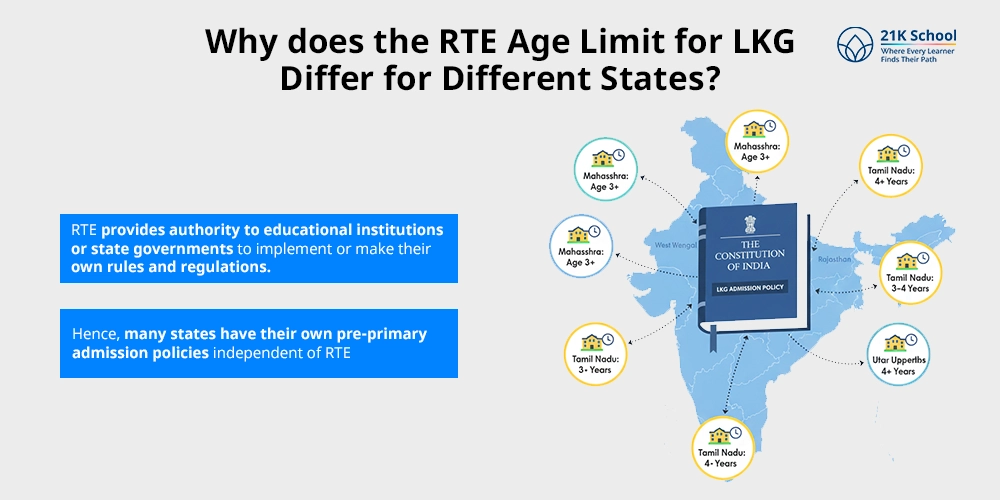
The RTE age limit varies for different states because of flexibility given by RTE Act.
RTE provides authority to educational institutions or state governments to implement or make their own rules and regulations. Hence, many states have their own pre-primary admission policies independent of RTE
However, the RTE Act is a national Act that mandates free education to all between the age group of 6 to 14.
Another reason due to which the age limit differs is because of the state autonomy, which means as per the 42nd Amendment Act of 1976 states that both state and central government are applicable to implement and change educational criterias.
Along with that every state has their own set of rules and policies, due to which states have to set their own RTE admission age limit.
Lets explore the detailed guide on equal education .
The age limit also varies as per the policy of the state governments. Below you can check the state wise age criteria for RTE admission.
| States | RTE Age Limit (Approximate values) |
| West Bengal | 4 years to 5 years |
| Tamil Nadu | 3 years 6 months to 5 years |
| Karnataka | 3 years 5 months to 5 years |
| Maharashtra | 4 years to 5 years |
| Uttar Pradesh | 3 years to 5 years |
| Madhya Pradesh | 3.5 years to 4.5 years |
| Haryana | 4 years to 5 years |
| Odisha | 3 years to 5 years |
Important Dates: RTE LKG 2026-27
RTE admission dates for LKG also vary from state to state, mostly the admission session starts from February or March and continues till April or May.
To check the correct dates for different states it is necessary to visit the official website of RTE.
The admission dates for RTE 2026-2027 will vary according to states policy and will begin soon. Here you can check the important dates for state-wise RTE LKG 2026-27 admission
1. West Bengal
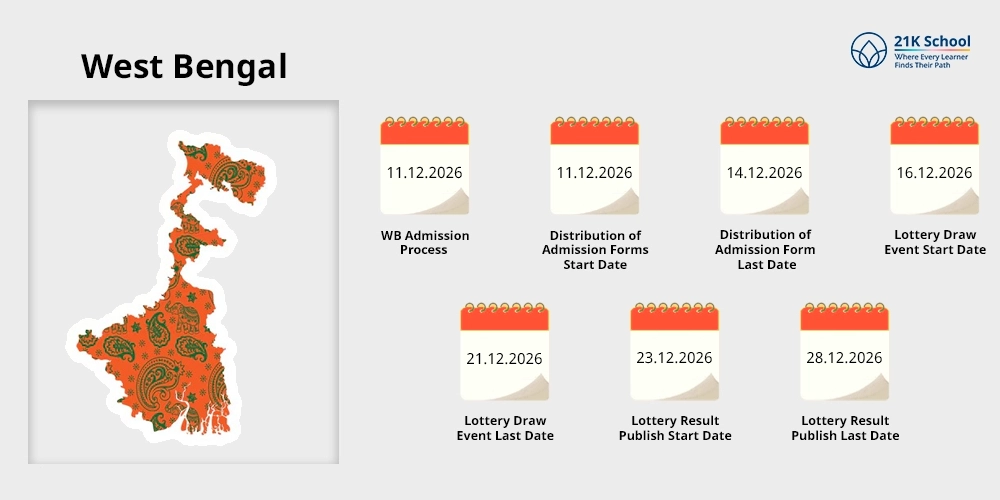
| Event | Date (Tentative) |
| WB Admission Process | 11.12.2026 |
| Distribution of Admission Forms Start Date | 11.12.2026 |
| Distribution of Admission Forms Last Date | 14.12.2026 |
| Lottery Draw Event Start Date | 16.12.2026 |
| Lottery Draw Event Last Date | 21.12.2026 |
| Lottery Result Publish Start Date | 23.12.2026 |
| Lottery Result Publish Last Date | 28.12.2026 |
2. Andhra Pradesh
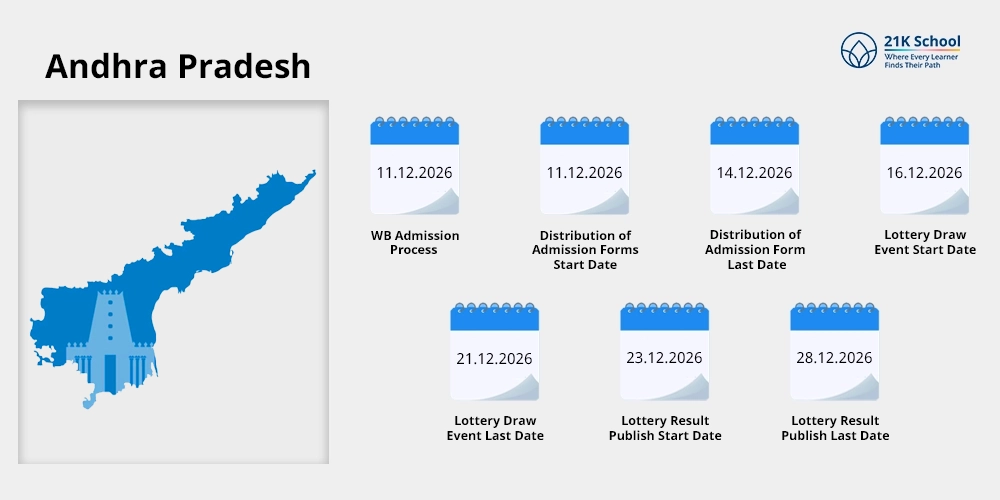
| Event | Date (Tentative) |
| Notification for Admission | 17.4.2026 |
| Registration on the Portal Starts on | 28.4.2026 |
| Registration on the Portal Ends on | 14.5.2026 |
| Eligibility of Students List | 16.5.2026 |
| 1st round lottery results | 21.5.2026 |
| 2nd round lottery results | 6.6.2026 |
| Student Admission Last Date | 12.6.2026 |
3. Karnataka
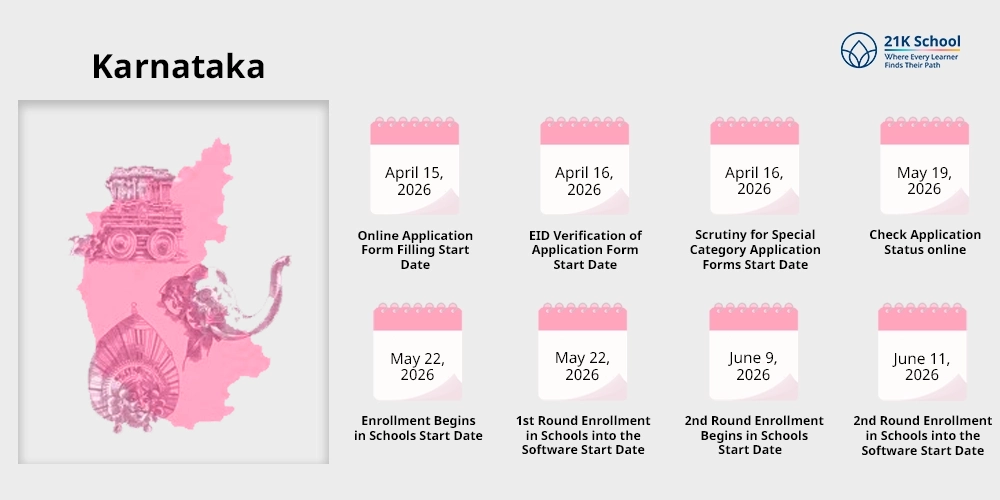
| Event | Date (Tentative) |
| Online Application Form Filling Start Date | April 15, 2026 |
| EID Verification of Application Form Start Date | April 16, 2026 |
| Scrutiny for Special Category Application Forms Start Date | April 16, 2026 |
| Check Application Status online | May 19, 2026 |
| Enrollment Begins in Schools Start Date | May 22, 2026 |
| 1st Round Enrollment in Schools into the Software Start Date | May 22, 2026 |
| 2nd Round Enrollment Begins in Schools Start Date | June 9, 2026 |
| 2nd Round Enrollment in Schools into the Software Start Date | June 11, 2026 |
4. Uttar Pradesh
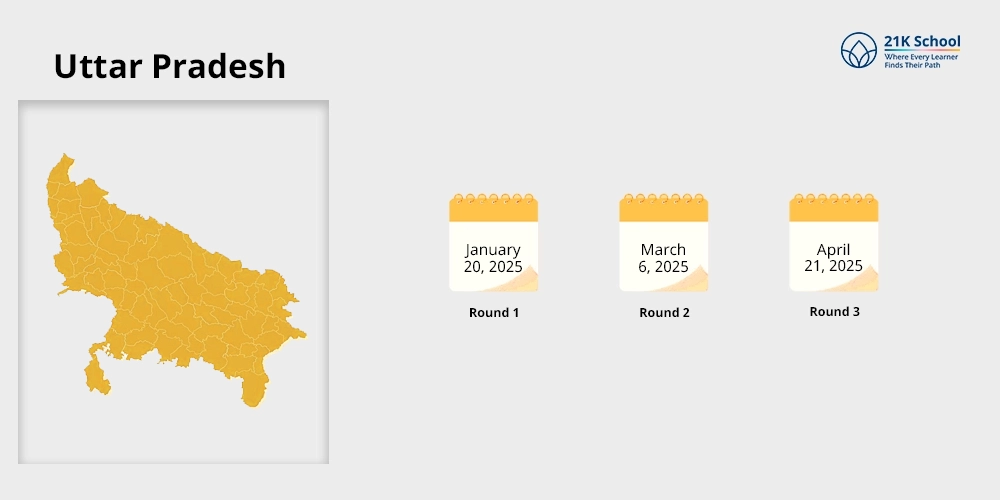
| Round | Application Start |
| Round 1 | January 20, 2025 |
| Round 2 | March 6, 2025 |
| Round 3 | April 21, 2025 |
Understand the Right CBSE Age Limit for LKG Kids .
RTE Act 2009: A Glance
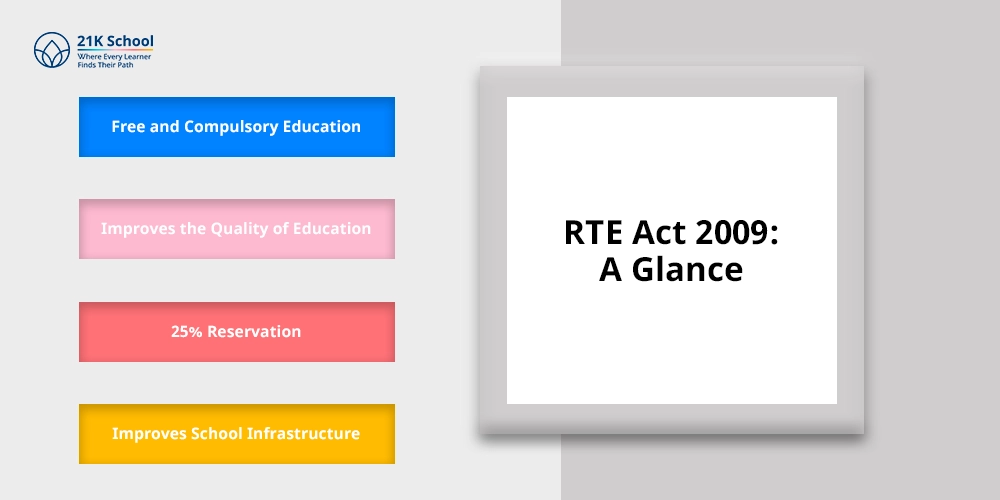
RTE Act was introduced in the year 2009 by the Parliament of India, which states that every student should receive free and compulsory education between the age group of 6 to 14. Later in the year 2010, RTI became a fundamental right of every child.
Under the RTE Act every government school or government approved school has to provide free elementary education to economically poor children.
This Act also provides admission to children who are unable to take admission due to insufficient documents or age criteria.
This Act is also known for prohibiting punishments and capitalised fees. Here you can check some other features of RTI.
1. Free and Compulsory Education
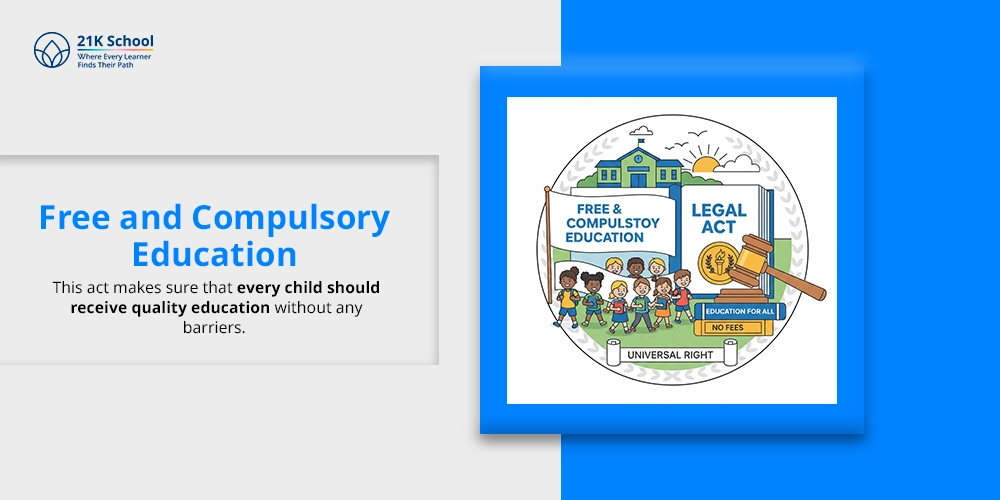
The main aim of the RTE Act is to provide students with free and compulsory education. This act makes sure that every child should receive quality education without any barriers.
This Act focuses on providing extra support to economically weaker students as well as allows schools to follow the same guidelines for admission. Another major aim of this Act is to eliminate the illiteracy rate.
2. Improves the Quality of Education
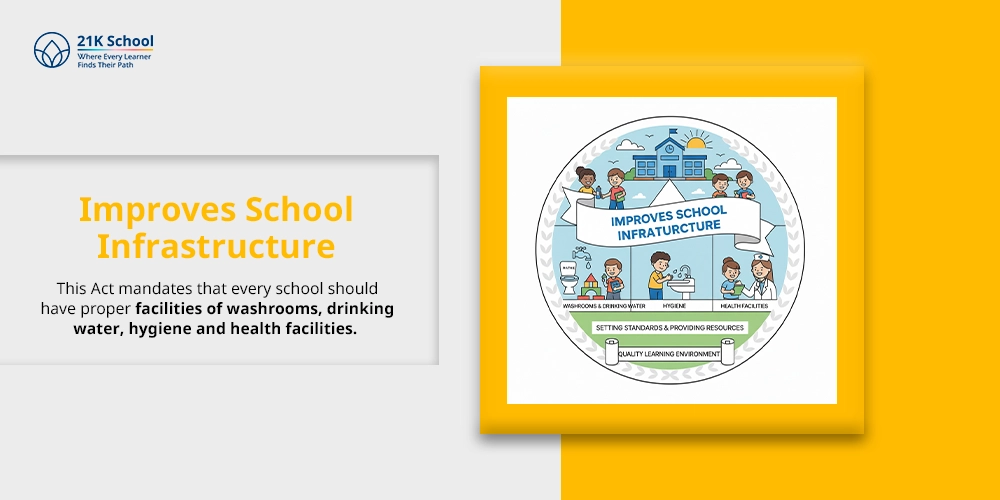
The RTE Act focuses on improving the quality of education by implementing new standards of education and providing extra guidance to students.
This Act also prohibits punishment and capitalised fees, which helps in creating a positive learning environment .
Through providing teachers training as well as improving the educational standards are another objective of RTE.
3. 25% Reservation
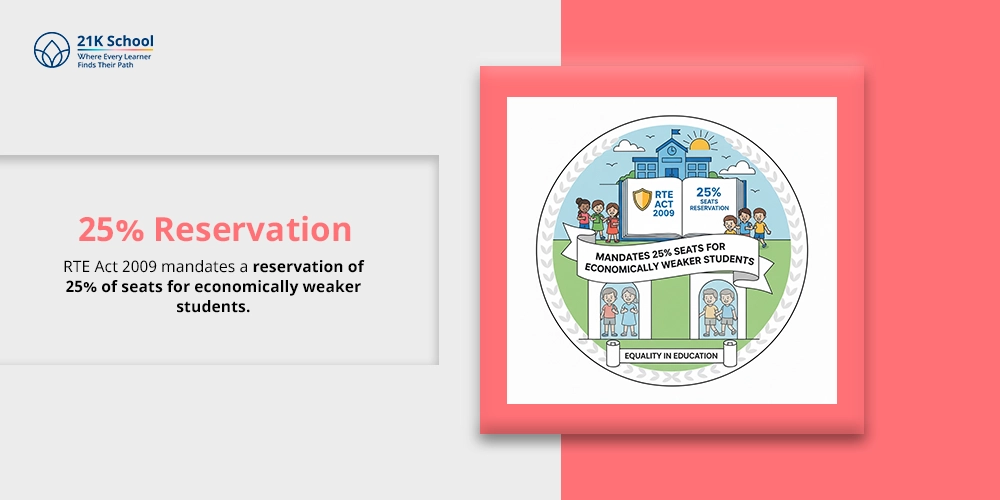
RTE Act 2009 mandates a reservation of 25% of seats for economically weaker students. As per the RTE Act every school where it is private or self financed schools have to keep 25% of seats reserved for poor children.
The main objective of the reservation is to make sure that no student should left behind studies and receive equal learning opportunities.
4. Improves School Infrastructure
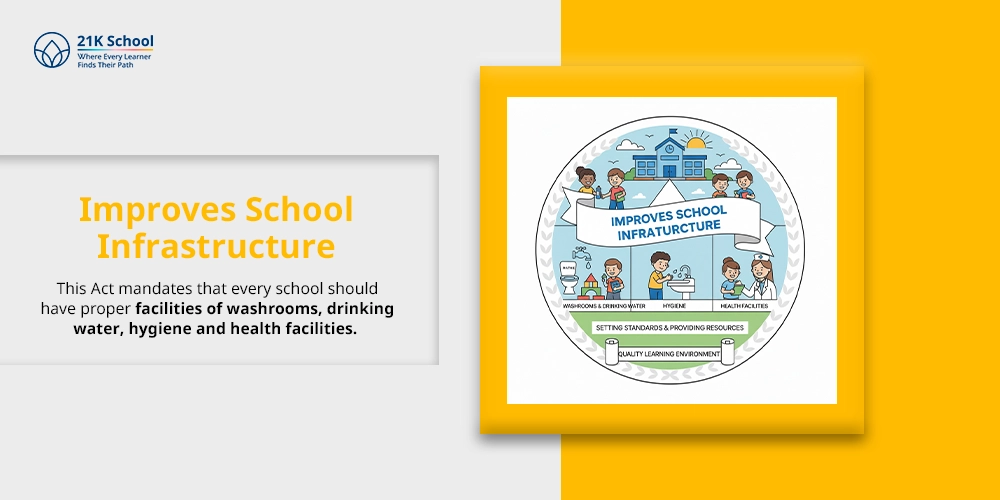
Another significant objective of RTE is to improve the infrastructure of schools by setting standards and providing necessary resources.
This Act mandates that every school should have proper facilities of washrooms, drinking water, hygiene and health facilities.
Conclusion
As per the Right to Education (RTE) Act 2009, 6 to 14 years’ old children have a right to free and compulsory education , which also includes the entitlement of a 25% reservation in seats in private schools for children of economically weaker sections.
Even though the Act primarily concerns elementary education, several states have assimilated the RTE’s stipulations for admissions into LKG as well.
As for the age limit to be eligible for LKG under RTE for 2026-27, the state-wise variation can be noted as: in Karnataka, Maharashtra and Haryana the age is between 4 to5 years, while Tamil Nadu and Uttar Pradesh start admissions from 3 years of age.
The online application process takes place through the state’s RTE portal and usually opens between January and March, although this varies by state.
